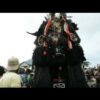African History
THE CONTRIBUTIONS OF AROCHUKWU TO IGBO CIVILIZATION
INTRODUCTION
Arochukwu or Aro for short happens to be one of the most powerful names in Igbo history. Often noted as the spiritual and political heart of ancient Igboland, Arochukwu stood as a centre of trade, religion, and justice that shaped the destiny of millions.
From the famous Ibini Ukpabi oracle known to the world as the Long Juju to its vast trading networks and cultural influence, Arochukwu helped in no small measure in building what we now know as Igbo civilization. Its people combined spirituality with enterprise, faith with diplomacy, and local tradition with far-reaching vision.
Understanding Arochukwu beyond just being a town in Abia State is, therefore, key to understanding how the Igbo nation evolved in its systems of justice, economy, and belief. And that is what this article seeks to achieve.
ORIGINS OF AROCHUKWU

Arochukwu’s story dated as far back as the late 1600s and early 1700s. The Aro people came together through a mix of migration, war, and alliances. Oral history says that the Aro allied with the Akpa warriors who came from the east of the Cross River, fought and defeated the Ibibio people who first occupied the area. This victory let to the establishment of Arochukwu as a spiritual and political stronghold.
Scholars like Nwauwa (1991) placed this founding generation around 1690-1720, seeing it as part of larger shifts in power in the Niger-Benue and Cross River areas. Because of its strategic location in rainforest regions, and with links to river routes, Arochukwu was well positioned to interact with many neighbouring societies.
THE FAMOUS AROCHUKWU ORACLE – IBINI UKPABI
One of the biggest influences of Arochukwu to Igbo civilization back in the day is rooted in their famous oracle known as Ibini Ukpabi, or the Long Juju, as named by the Europeans. The shrine of this powerful oracle was more than a religious site. It was a centre for law, justice, and identity. It served as a supreme court where disputes were resolved.
People came from many towns and villages to consult the oracle over serious cases such as murder, witchcraft, poisoning, land disputes, and family quarrels. Decisions coming from the oracle were taken seriously. No matter how rich or powerful someone was, they were expected to accept the verdict of Ibini Ukpabi.
The people believed that Ibini Ukpabi spoke for Chukwu, the Supreme Being in Igbo cosmology. Because of that, the oracle was the highest spiritual authority in many parts of Igboland and beyond. Its rituals, tunnels, caves, and priesthood had spiritual power
Ibini Ukpabi also played a moral role, teaching what was considered right or wrong in social behavior. It helped to maintain order. Villages respected its judgments, and many local customs, taboos, and standards of behavior were reinforced through the oracle’s influence.
Shrines were set up in many places, sometimes, referred to as satellite shrines where people could bring disputes. These shrines were parts of a larger judicial framework connected to the central oracle in Arochukwu.
In many ways, the oracle in Arochukwu functioned similarly to a supreme court in traditional Igbo society.
However, besides providing justice, it is also documented that some verdicts from the oracle may have been manipulated. There are some accounts that some people who were declared guilty by the oracle were sold into the slave trade instead of being executed. This is in addition to the report that some people who visited the shrine disappeared without trace.
These reports validated that the spiritual power of Ibini Ukpabi was not only used to give justice but were sometimes, used for economic gain.
AROCHUKWU’S INFLUENCE IN TRADE, ECONOMY, AND POLITICAL DOMINANCE
Arochukwu’s influence was not limited religious or judicial. They had a strong presence in trade, diplomacy, and local governance. Beyond their influence in these areas, the Aro people were also skilled traders who built a wide network known as the Aro Confederacy. They formed alliances with nearby Igbo subgroups and with groups from Cross River, Ibibio and other neighbouring peoples. The Aro Confederacy was a loose but powerful alliance of settlements tied by religion, trade, and shared interests.
The Aro established trading posts and colonies in many places. The strategic location of the town played a vital role in linking the hinterland with markets that stretched to coastal towns such as Calabar, Bonny, and Opobo, where there were trade activities by the Europeans. They traded items like palm oil, salt, kola nuts, cloth, and other forest products.
Because of their oracular authority, that is, the fact that Aro traders used the Ibini Ukpabi to settle trade disputes helped to make strengthen their network and make it more reliable. They were trusted by many, and that helped them become middlemen between the hinterland and coastal markets.
Sadly, slavery is part of the Arochukwu story. They played a notable part in and benefitted greatly from the Atlantic slave trade. Captives from war, judicial cases, or raids were sometimes, sold to European traders. The wealth that was amassed through the slave trade helped in expanding the influence of Arochukwu.
All of these allowed Aro influence to spread without them needing to occupy every community with their military might.
AROCHUKWU’S CONTRIBUTIONS TO IGBO CULTURE, LANGUAGE AND IDENTITY

Arochukwu’s contributions also extended into culture, social identity, language, and customs. Through trade, migration, and settlement, the Aro helped in spreading Igbo customs, beliefs, and language into areas beyond their homeland. Their influence meant that distant communities often had Aro quarters or Aro-oriented traditions.
Their interactions with neighbours such as the Efik and the Ibibio people led to cultural exchanges in food, dress, and religious practices.
Because Aro people mixed with Ibibio and Efik peoples through trade and sometimes intermarriage, their version of Igbo included words borrowed from those languages. This made Arochukwu dialect somewhat unique.
Although many histories focused on men as priests, traders, warriors, Arochukwu women played significant parts, especially during the colonial period in family networks, in trade, in oral tradition, in war impact, and in preserving culture. Studies on colonial period prove that Arochukwu women contributed to resilience in communities, preserving customs, stories, and social cohesion.
From the example of the Aro system, it became evident that even in a society without visible kings or heads, a supra-local institution could emerge, linking different communities through shared religion and commerce. It is common knowledge that Arochukwu gave the Igbo society a wider sense of connection beyond the village level.
THE COLONIAL DISRUPTION OF AROCHUKWU DOMINANCE
Arochukwu reached high influence, but colonial pressures, eventually, changed everything. The coming of the British in the late nineteenth century brought an end to their dominance. By the time the colonial officials realized that the Aro Confederacy and Ibini Ukpabi stood in the way of extending their rule, the British organized a military campaign between 1901 and 1902 known as the Aro Expedition.
The goal was to destroy the Long Juju and thus, break the political and trade networks of the Aro people. After a heavy fighting, the British succeeded, and Arochukwu lost its spiritual and political authority.
Colonial rule introduced new legal systems, new courts, and foreign religions, especially Christianity. Many of the traditional functions of the oracle were either suppressed or replaced. Trade routes changed. Communities that depended on Aro networks lost those links. And with that, the moral and spiritual authority of Arochukwu declined under colonial policies.
AROCHUKWU LEGACIES IN IGBO CIVILIZATION

Despite the damaging side of Arochukwu’s contributions, they left legacies, both material and spiritual, that still matter.
Many Igbo people today know about Arochukwu’s oracle, the Aro Confederacy, and the “Long Juju” stories. These stories teach about justice, morality, power, and spiritual authority. They are part of folklore, songs, literature, and school histories.
Places like the caves, tunnels, and remains of Ibini Ukpabi are now sites of cultural interest. People visit the sites both to see what remains and to learn. This helps in preserving the physical and spiritual heritage of Arochukwu.
Historians, anthropologists, archaeologists continue to study Arochukwu to understand the formation of Igbo state, trade networks, religious practices, and colonial impact. Works like “Integrating Arochukwu into the Regional Chronological Structure” are examples.
Even in modern times, the Aro diaspora, town unions, and local leaders have attempted to rebuild infrastructure, schools, roads, and social services in Arochukwu. The cultural pride connected to Arochukwu has often been a motivation for people to contribute to their community’s growth.
A BALANCED VIEW OF THE AROCHUKWU CONTRIBUTIONS
It is important to note that Arochukwu’s story is not simple. It is a complex one. To understand their contributions, we must recognize both the good and the damaging aspects of it.
On the one hand, the Aro built institutions that promoted justice in their own way, mediated disputes, and made many Igbo communities more connected, socially and economically. Their spiritual and cultural influence gave Igbo civilization a richer identity. The colonies and settlements they created across Igboland in places like Okporoenyi, Ndi-Izuogu, Ndi-Ikelionwu, Ndi-Owu, Ajali, just to mention a few, remains today a monumental testimonial of Aro’s influence and hegemony in Igbo politics and culture.
However, on the flip side, their deep involvement in the slave trade brought untold suffering to many communities. According to reports, the Ibini Ukpabi shrine was linked with the trans-Atlantic slave trade, where captives from judicial cases and wars were funneled into trade routes. As such, many people who went to consult the oracle never returned. Some of them were condemned by the priests and sold into slavery.
Aro people assumed the position of middleman in the Euro-African trade, and in their eagerness to meet the demand for captives, they rose to the challenge of tapping the thickly populated Igbo hinterland, and then entered various alliances with neighbouring communities. That enabled them access the sought-after European trade goods in exchange for enslaved people.
They did not only use their dreaded oracle, the Ibini Ukpabi, to achieve their commercial goals, they also hired people of neighbouring Igbo war-like clans of Abam, Edda, Nike, and Ohafia to assist them with catching captives, expeditions, or raids, and to generally protect Aro interests and enforce their will whenever it was necessary to do so.
The spiritual power of the oracle, for instance, was use to silence opposition or to serve economic ends. It is a known fact that Arochuchwu amassed much of their wealth from slave trade. Also, the arrival of the colonial masters exposed many weaknesses in how dependent the Aro system was on belief in the oracle and on certain trade networks.
So, it’s important to view Arochukwu’s contributions neither as entirely heroic nor entirely harmful but as complex, with both good and bad sides.
IN CONCLUSION…
As far as Igbo civilization back in history was concerned, Arochukwu was not just a town. It was a centre of power, spiritual authority, trade, culture, and identity for many parts of Igboland. From the founding of the oracle of Ibini Ukpabi to reaching out to distant communities through trade, alliance, and settlement, Arochukwu played a central role in shaping what we today call Igbo civilization.
Even though colonial powers broke much of Arochukwu’s institutional power, the spiritual, cultural, and social legacies remain strong till date. Their influence lives on in stories, language, festivals, cultural memory, and in the way many Igbo people understand justice, power, and spirituality.
REFERENCES
- https://www.cambridge.org/core/journals/history-in-africa/article/abs/integrating-arochukwu-into-the-regional-chronological-structure/1E94FA279DBF768A8A04DF017B753017
- https://www.si.edu/object/siris_sil_685421
- https://ozikoro.com/arochukwu-oracle-the-spiritual-empire-that-controlled-trade-justice-and-war-in-precolonial-igboland
- https://www.nigerianjournalsonline.com/index.php/NJAS/article/view/2377
- https://www.ajol.info/index.php/ijdmr/article/view/197229
- https://nnewicity.com/eze-aro-of-arochukwu-the-religious-political-power-of-the-aro-kingdom/
























